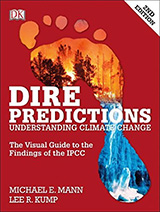Welcome to METEO 469!
New to METEO 469?
Registered students should begin by reading through the Course Orientation, located in the navigation menu.
Not registered? Students who register for this Penn State course gain access to assignments and instructor feedback and earn academic credit.
Quick Facts about METEO 469

- Instructor - Fan Wu
- Course Author - Michael Mann
- Overview - METEO 469 is a required course for the Bachelor of Arts in Energy Sustainability and Policy online degree program, geared towards students who are able to study only part-time and at a distance. This course provides an introduction to global warming and climate change, covering the basic science, projected impacts, and approaches to mitigation.
- Learning Environment - This website provides the primary instructional materials for the course. The Resources menu links to important supporting materials, while the Course Outline menu links to the course lessons. Canvas, Penn State's course management system, is used to support the delivery of this course as well, as it provides the primary communications and submission tools for the course.
- Topics of Study - The content of this course is divided into 12 lessons. Each lesson will be completed in approximately 1 week. Lesson learning activities take the form of discussions, quizzes, and online climate simulations.
- Lesson 1: Introduction to Climate and Climate Change
- Lesson 2: Climate Observations, Part 1
- Lesson 3: Climate Observations, Part 2
- Lesson 4: Modeling of the Climate System
- Lesson 5: Modeling of the Climate System (cont.); Comparing Models and Observations
- Lesson 6: Carbon Emission Scenarios
- Lesson 7: Projected Climate Changes, Part 1
- Lesson 8: Projected Climate Changes, Part 2
- Lesson 9: Climate Change Impacts
- Lesson 10: Vulnerability and Adaptation to Climate Change
- Lesson 11: Geoengineering
- Lesson 12: Reducing Greenhouse Gas Emissions
NOTE:
This course is offered as part of the Open Educational Resources initiative of Penn State's John A. Dutton e-Education Institute. You are welcome to use and reuse materials that appear in this site (other than those copyrighted by others) subject to the licensing agreement linked to the bottom of this and every page.
